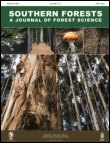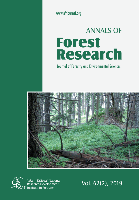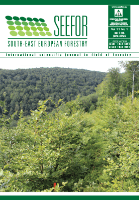
FORESTRY CHRONICLE
Scope & Guideline
Connecting research and real-world forestry solutions.
Introduction
Aims and Scopes
- Forest Management Practices:
The journal emphasizes innovative forest management strategies, including partial harvesting systems, adaptation to climate change, and sustainable practices aimed at enhancing forest health and productivity. - Ecological and Environmental Studies:
Research on the ecological dynamics of forest ecosystems, including growth responses, species interactions, and the impacts of climate change on forest resilience, is a core focus. - Technological Advances in Forestry:
The integration of technology such as remote sensing, LiDAR, and modeling techniques to improve forest inventory, management, and research methodologies is prominently featured. - Policy and Economic Analyses:
The journal addresses the socio-economic aspects of forestry, including the economic impacts of forest management practices, policy implications, and the role of forests in climate change mitigation. - Community and Indigenous Engagement:
There is a significant focus on the intersection of forestry practices with Indigenous knowledge systems and community-based forestry initiatives.
Trending and Emerging
- Climate Change Adaptation:
There is a strong trend towards research aimed at understanding and mitigating the impacts of climate change on forest ecosystems, including adaptive silviculture and resilience-building practices. - Forest Fire Management:
Increasing focus on strategies for adapting forest management to the realities of forest fires, particularly in boreal forests, indicates a growing recognition of fire as a significant ecological and management factor. - Carbon Sequestration and Climate Mitigation:
Research on the role of forests in carbon sequestration and their potential contributions to climate change mitigation is gaining prominence, reflecting global environmental priorities. - Community-Based Forestry and Indigenous Knowledge:
Emerging themes include the integration of Indigenous knowledge and community engagement in forestry practices, emphasizing collaborative approaches to forest management. - Technological Integration in Forestry:
The use of advanced technologies such as remote sensing and modeling tools is increasingly featured, showcasing innovations that enhance forest management and research capabilities.
Declining or Waning
- Traditional Timber Production:
Research specifically focused on traditional timber production practices has diminished, possibly due to the increasing emphasis on sustainability and ecological considerations over sheer production metrics. - Classic Silviculture Techniques:
There appears to be a waning interest in classic silvicultural methods without a climate adaptation context, as newer, more adaptive approaches gain traction in response to environmental changes. - Historical Forestry Practices:
Studies examining historical forestry practices and their direct applications have become less prominent, as contemporary challenges and innovations take precedence in the discourse. - Generalized Forest Inventory Methods:
The focus on broad, generalized forest inventory methods is declining in favor of more sophisticated, technology-driven approaches that provide detailed and specific ecological data.
Similar Journals

FOREST SCIENCE
Empowering the future of forest management.FOREST SCIENCE, published by Oxford University Press Inc, is a pivotal journal in the field of forestry and ecological modeling, boasting an impressive track record since its inception in 1970. With an ISSN of 0015-749X and E-ISSN 1938-3738, the journal provides a valuable platform for the dissemination of high-quality research and studies that address contemporary challenges in forestry and ecology. It ranks in the Q2 category for both ecology and forestry and holds a Q3 ranking in ecological modeling according to the latest evaluations, illustrating its significant contribution to these fields. The journal is accessible through various options, facilitating broad readership and engagement within the academic community. As part of its commitment to advancing knowledge and practices in forest management and conservation, FOREST SCIENCE seeks to bridge theoretical research with practical applications, making it an indispensable resource for researchers, professionals, and students alike.

Southern Forests-A Journal of Forest Science
Illuminating Pathways in Forest Research and ConservationSouthern Forests: A Journal of Forest Science, published by Taylor & Francis Ltd, serves as a vital platform for scholarly discourse in the field of forestry. With a robust ISSN of 2070-2620 and E-ISSN of 2070-2639, this journal highlights cutting-edge research and vital advancements from 2008 to 2024. Based in the United Kingdom, it continues to make significant contributions, evidenced by its current Q3 ranking in the forestry category of Scopus as well as its rank of 94 out of 174 in Agricultural and Biological Sciences. This journal caters to a diverse audience of researchers, professionals, and students, providing access to high-quality articles that promote sustainable forest management and ecological studies. Despite being classified as a non-open access journal, it remains a key resource, ensuring accessibility to crucial information that addresses both local and global forest challenges.

BALTIC FORESTRY
Elevating Global Discourse on Forest ConservationBALTIC FORESTRY, published by the INST FORESTRY LRCAF in Lithuania, is a prominent academic journal that serves as a platform for disseminating cutting-edge research in the field of forestry. With an ISSN of 1392-1355, this journal is dedicated to advancing knowledge on sustainable forest management, ecological impacts, and resource conservation, among other vital topics. As of 2023, it has been categorized in the Q3 quartile for forestry in Scopus, indicating its solid reputation among peer-reviewed publications, ranking #95 out of 174 in the realm of Agricultural and Biological Sciences. BALTIC FORESTRY features contributions from researchers across the globe and encourages innovative approaches to solving contemporary challenges in forestry, making it an essential resource for professionals, scholars, and students alike. Although it operates under subscription-based access options, the journal's commitment to fostering academic discourse is unwavering, aiming to bridge the gap between theory and practice in forest science.

Lesnoy Zhurnal-Forestry Journal
Connecting Global Scholars for Sustainable Forestry SolutionsLesnoy Zhurnal-Forestry Journal is a prominent academic publication dedicated to advancing the field of forestry and environmental sciences. Published by the Northern Arctic Federal University M. V. Lomonosov, this journal focuses on innovative research, practices, and policies related to forestry management and conservation. With an Open Access model established since 2015, the journal ensures widespread dissemination of knowledge and foster collaborative research across global scholarly communities. Located in Arkhangelsk, Russia, the Lesnoy Zhurnal appeals to researchers, professionals, and students alike, providing a platform for sharing valuable insights and addressing emerging challenges in forestry. Though specific metrics like HIndex and Scopus rankings are presently unlisted, the journal is committed to excellence and aims to enhance its visibility and impact within the scientific community. This publication is not only a critical resource for ongoing research but a key player in shaping sustainable forestry practices in a rapidly changing environment, making it indispensable for anyone involved in forestry and environmental studies.

Annals of Forest Research
Cultivating a deeper understanding of our forests.Annals of Forest Research is a peer-reviewed journal dedicated to advancing knowledge in the fields of forestry, ecology, and plant sciences. Published by EDITURA SILVICA in Romania, this journal has been an open access publication since 2008, providing a platform for researchers to share their insights and findings with a global audience. The journal operates under a rigorous selection process, reflected in its positioning within the Q2 category in Forestry and Q3 in both Ecology and Plant Science as of 2023. With Scopus rankings indicating a solid percentile among its peers, Annals of Forest Research continues to play a vital role in disseminating innovative research and fostering scholarly dialogue. Researchers, professionals, and students are encouraged to explore its diverse range of articles, which address both foundational and contemporary issues in forest management and environmental sustainability, contributing to the sustainable use and preservation of forest ecosystems.

SILVA FENNICA
Bridging Ideas for a Greener TomorrowSILVA FENNICA, publishing since 1976, is a premier open-access journal dedicated to the advancement of knowledge in the fields of Forestry and Ecological Modeling. Released under the stewardship of the Finnish Society of Forest Science in collaboration with the Natural Resources Institute Finland, this journal serves as a vital resource for researchers, professionals, and students alike, fostering the exchange of innovative ideas and research findings. With an impressive impact factor placed in the Q1 category for Forestry and holding a commendable Q3 position in Ecological Modeling as of 2023, SILVA FENNICA illustrates its significance by ranking 47th in Forestry and 19th in Ecological Modeling according to Scopus metrics, reflecting a robust peer recognition and dissemination of scholarly work. The journal offers open access to all published articles since 1998, ensuring wide visibility and accessibility of research outputs. Located in Finland, SILVA FENNICA invites contributions that address sustainable forestry practices, forest ecology, and ecological modeling with a commitment to promoting scientific discussion and environmental stewardship.

Madera y Bosques
Pioneering Insights into Forestry ChallengesMadera y Bosques is a prominent academic journal specializing in the fields of forestry and wood science, published by INST ECOLOGIA A C in Mexico. With an ISSN of 1405-0471 and an E-ISSN of 2448-7597, it has established itself as a vital platform for disseminating research findings, innovative practices, and methodologies pertinent to sustainable forest management and ecological conservation. Operating since 2008, the journal covers a wide scope of topics related to the complexities of forest ecosystems, the importance of biodiversity, and the challenges posed by climate change. Despite its categorization in Q4 for the year 2023 in the Forestry category, Madera y Bosques aims to elevate discourse and practice in the field, providing a voice to emerging researchers and seasoned professionals alike. Additionally, the journal adheres to open access principles, enhancing the visibility and accessibility of its articles to a global audience. Researchers and practitioners are encouraged to engage with its rich content to further their understanding and impact in the world of forestry.

Journal of Forest Science
Advancing forest knowledge for a sustainable future.Journal of Forest Science, published by the Czech Academy Agricultural Sciences, serves as a pivotal resource in the field of forestry and soil science. With its ISSN 1212-4834 and E-ISSN 1805-935X, this Open Access journal has been delivering insightful research since 2003, making knowledge freely available to researchers and practitioners globally. Hailing from the Czech Republic, the journal has established a notable impact within the academic community, as evidenced by its placements in the Q2 quartile for Forestry and Q3 for Soil Science according to the latest rankings. This positions the Journal of Forest Science favorably within academic discourse, ranking #73 out of 174 in Forestry and #84 out of 159 in Soil Science on Scopus, placing it at the 58th and 47th percentiles respectively. Covering a wide range of topics that intersect with environmental sustainability, forest management, and ecological research, the journal aims to foster innovation and collaboration within the scientific community. Researchers, professionals, and students can access published articles easily, bolstering the advancement of knowledge in forest science and its related disciplines.

Sumarski List
Shaping the Future of Forestry Through Rigorous ScholarshipSumarski List, published by the Croatian Forestry Society, serves as a key platform for the dissemination of knowledge and research within the field of forestry. Established in the early 1980s, this journal has maintained a consistent commitment to advancing the understanding of forest management, ecology, and conservation. With an ISSN of 0373-1332 and an E-ISSN of 1846-9140, it provides researchers and practitioners with valuable insights into current trends and practices in forestry, although it currently falls within the Q4 category in the 2023 forestry rankings. The journal is accessible primarily in printed format, promoting rigorous scholarship and discussion. The important contributions of Sumarski List are vital for fostering a greater appreciation of forestry in Croatia and beyond, making it an essential resource for those dedicated to tackling the pressing challenges in forest ecosystems.

SEEFOR-South-East European Forestry
Empowering knowledge for the future of South-East European forestry.SEEFOR-South-East European Forestry is a premier open-access journal dedicated to advancing knowledge in the field of forestry and environmental science. Published by the CROATIAN FOREST RESEARCH INSTITUTE, this journal has been operational since 2010, providing a platform for research that focuses on the unique forestry dynamics of the South-East European region. With an ISSN of 1847-6481 and an E-ISSN of 1849-0891, SEEFOR is recognized for its commitment to disseminating high-quality research that addresses critical issues in forestry management, conservation, and sustainable development. The journal is indexed in Scopus, placing it within the third quartile (Q3) of forestry journals, reflecting its significance within the academic community. SEEFOR aims to connect researchers, practitioners, and policymakers, fostering collaboration and innovation in fostering sustainable forestry practices in Croatia and beyond. Submissions are welcome in a range of areas including forest ecology, policy development, and socio-economic impacts, making it an invaluable resource for professionals and students alike.